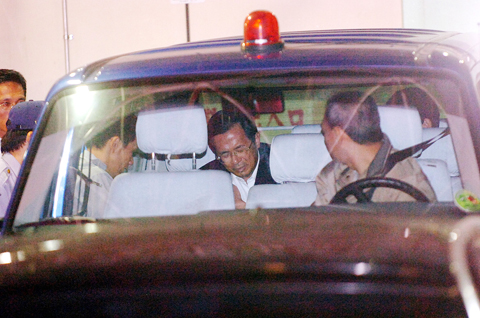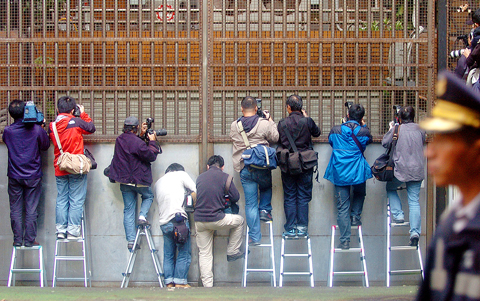The Taipei District Court early yesterday morning granted a request by prosecutors to detain former president Chen Shui-bian (陳水扁) in connection with corruption allegations, making him the first former president in the nation’s history to be arrested.
Chen is accused of embezzling about NT$15 million (US$450,000) while in office, money laundering, taking bribes and forgery.
The court decision capped 24 hours of high political drama, which saw a defiant Chen being led away in handcuffs, taken to hospital after claiming he had been assaulted by a bailiff and finally put behind bars.

PHOTO: GEORGE TSORNG, TAIPEI TIMES
Chen was escorted to court at about 4:30pm on Tuesday for a hearing on a request for his detention following seven hours of questioning by prosecutors from the Supreme Prosecutors’ Office’s Special Investigation Panel (SIP).
Taipei District Court spokesman Huang Chun-min (黃俊明) said judges Liu Huang-chi (劉煌基), Yeh Li-chi (葉力祺) and Liu Hsiu-chun (劉秀君) began the hearing to consider the detention request at about 8pm on Tuesday night. During the hearing, Chen complained he had been hit by one of the guards while leaving the prosecutors’ office.
At about 11pm, Liu interrupted the hearing and ordered that Chen be sent to the National Taiwan University Hospital for an examination.

PHOTO: CHANG CHIA-MING, TAIPEI TIMES
Prosecutors reviewed video footage to determine when Chen was allegedly hit, but SIP spokesman Chen Yun-nan (陳雲南) said later that no evidence was found to back the claim.
Although doctors confirmed that the former president had strained an arm muscle, there was no evidence to prove that the injury was the result of a blow.
Chen Shui-bian was then escorted back to the court and the hearing resumed at 1am. At 7:05am, the three judges reached a decision, granting the detention request.
Chen Shui-bian left the court at about 8am under the protection of National Security Bureau (NSB) special agents and police, arriving at the Taipei Detention Center in Tucheng (土城), Taipei County, at about 8:30am.
At about the same time, Ministry of Justice Deputy Minister Huang Shih-ming (黃世銘) told a press conference that although the former president had been detained, he would have certain privileges because he was innocent until proven guilty.
“He can choose whether he wants a single room,” Huang said. “One of the NSB agents responsible for his security will also be allowed to stay with him to act as a liaison officer.”
Huang said Chen Shui-bian’s security was now the responsibility of the detention center, although NSB agents would be called whenever he was summoned for hearings or questioning.
In a statement yesterday, Chen Shui-bian’s office said the former president would relinquish his right to appeal the detention ruling in protest at what he called “political persecution” and a “political vendetta” against him.
Chen Shui-bian’s lawyer, Cheng Wen-long (鄭文龍), said in a statement that it would be pointless for the former president to appeal because the SIP had already reached a verdict and “the script has already been written.”
“It is political persecution and a political vendetta,” Cheng said.
The statement said Chen Shui-bian had expected to be detained and that this was a sacrifice he would endure.
He was willing to bear the cross of persecution, but he would like to see all other Democratic Progressive Party (DPP) politicians — who he said were innocent — released, the statement said.
The office issued another statement denying that Chen Shui-bian had broken the law and criticizing the SIP for ignoring a Supreme Court ruling, which acquitted President Ma Ying-jeou (馬英九) of corruption charges on the grounds that Ma’s use of “special allowance funds” during his tenure as Taipei mayor exceeded the amount he received.
Chen Shui-bian’s office accused the SIP of being influenced by politics and bowing to the media, which it said is under the control of the Ma administration. The office also accused the SIP of violating Chen Shui-bian’s rights.
Saying the SIP had not obtained enough evidence to detain the former president, the statement said prosecutors had used diplomatic missions for political infighting and disregarded Chen Shui-bian’s efforts and the contribution he made to national security and Taiwan’s international space.
“Prosecutors and investigators have reached a point that they are acting arbitrarily and the judiciary autocratically,” the statement said.
The statement also argued that Chen Shui-bian was innocent of all charges and should be acquitted.
On the alleged misuse of Chen’s “state affairs fund,” the statement said the court should refer to Ma’s not guilty verdict and clear the former president’s name.
The statement said Chen claimed more than NT$190 million in “state affairs funds” and spent about NT$203 million during his two terms in office. Chen did not embezzle the money, it said.
It was “ludicrous” for prosecutors to claim that Chen Shui-bian and former National Security Council secretary-general Chiou I-jen (邱義仁) had claimed the money from the Ministry of Foreign Affairs’ “secret funds,” the statement said, adding that Chen had never pocketed any of the money.
Regarding political donations, the statement said Chen had admitted he had falsely declared leftover campaign funds and that some of the money was wired overseas without his knowledge.
Prosecutors, however, could not use his confession as a political tool or assume that political donations were bribes, the statement said.
As all politicians have leftover campaign funds and political donations, the statement requested a complete investigation into all election finances of all politicians — especially presidential candidates — since 1996.
The statement also criticized the Chinese Nationalist Party (KMT) for casting doubt on the legitimacy of other parties’ assets, given its own substantial assets. At issue was not whether Chen Shui-bian would be convicted, the statement said, but rather the urgent and serious issue of election funds, political donations and stolen party assets.
ADDITIONAL REPORTING BY AFP

AIR SUPPORT: The Ministry of National Defense thanked the US for the delivery, adding that it was an indicator of the White House’s commitment to the Taiwan Relations Act Deputy Minister of National Defense Po Horng-huei (柏鴻輝) and Representative to the US Alexander Yui on Friday attended a delivery ceremony for the first of Taiwan’s long-awaited 66 F-16C/D Block 70 jets at a Lockheed Martin Corp factory in Greenville, South Carolina. “We are so proud to be the global home of the F-16 and to support Taiwan’s air defense capabilities,” US Representative William Timmons wrote on X, alongside a photograph of Taiwanese and US officials at the event. The F-16C/D Block 70 jets Taiwan ordered have the same capabilities as aircraft that had been upgraded to F-16Vs. The batch of Lockheed Martin

GRIDLOCK: The National Fire Agency’s Special Search and Rescue team is on standby to travel to the countries to help out with the rescue effort A powerful earthquake rocked Myanmar and neighboring Thailand yesterday, killing at least three people in Bangkok and burying dozens when a high-rise building under construction collapsed. Footage shared on social media from Myanmar’s second-largest city showed widespread destruction, raising fears that many were trapped under the rubble or killed. The magnitude 7.7 earthquake, with an epicenter near Mandalay in Myanmar, struck at midday and was followed by a strong magnitude 6.4 aftershock. The extent of death, injury and destruction — especially in Myanmar, which is embroiled in a civil war and where information is tightly controlled at the best of times —

China's military today said it began joint army, navy and rocket force exercises around Taiwan to "serve as a stern warning and powerful deterrent against Taiwanese independence," calling President William Lai (賴清德) a "parasite." The exercises come after Lai called Beijing a "foreign hostile force" last month. More than 10 Chinese military ships approached close to Taiwan's 24 nautical mile (44.4km) contiguous zone this morning and Taiwan sent its own warships to respond, two senior Taiwanese officials said. Taiwan has not yet detected any live fire by the Chinese military so far, one of the officials said. The drills took place after US Secretary

THUGGISH BEHAVIOR: Encouraging people to report independence supporters is another intimidation tactic that threatens cross-strait peace, the state department said China setting up an online system for reporting “Taiwanese independence” advocates is an “irresponsible and reprehensible” act, a US government spokesperson said on Friday. “China’s call for private individuals to report on alleged ‘persecution or suppression’ by supposed ‘Taiwan independence henchmen and accomplices’ is irresponsible and reprehensible,” an unnamed US Department of State spokesperson told the Central News Agency in an e-mail. The move is part of Beijing’s “intimidation campaign” against Taiwan and its supporters, and is “threatening free speech around the world, destabilizing the Indo-Pacific region, and deliberately eroding the cross-strait status quo,” the spokesperson said. The Chinese Communist Party’s “threats